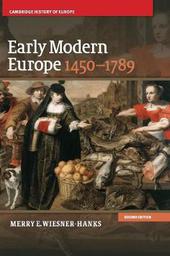
|
Early Modern Europe, 1450-1789
Hardback
Main Details
| Title |
Early Modern Europe, 1450-1789
|
| Authors and Contributors |
By (author) Merry E. Wiesner-Hanks
|
| Series | Cambridge History of Europe |
|---|
| Physical Properties |
| Format:Hardback | | Pages:563 | | Dimensions(mm): Height 259,Width 30 |
|
| ISBN/Barcode |
9781107031067
|
| Classifications | Dewey:940.22 |
|---|
| Audience | | Tertiary Education (US: College) | | Professional & Vocational | |
|---|
| Edition |
2nd Revised edition
|
| Illustrations |
15 Maps; 47 Halftones, unspecified
|
|
Publishing Details |
| Publisher |
Cambridge University Press
|
| Imprint |
Cambridge University Press
|
| Publication Date |
21 February 2013 |
| Publication Country |
United Kingdom
|
Description
The second edition of this best-selling textbook is thoroughly updated to include expanded coverage of the late eighteenth century and the Enlightenment, and incorporates recent advances in gender history, global connections and cultural analysis. It features summaries, timelines, maps, illustrations and discussion questions to support the student. Enhanced online content and sections on sources and methodology give students the tools they need to study early modern European history. Leading historian Merry Wiesner-Hanks skilfully balances breadth and depth of coverage to create a strong narrative, paying particular attention to the global context of European developments. She integrates discussion of gender, class, regional and ethnic differences across the entirety of Europe and its overseas colonies as well as the economic, political, religious and cultural history of the period.
Author Biography
Merry E. Wiesner-Hanks is Professor of History at the University of Wisconsin, Milwaukee and an experienced textbook author. Her recent books include Women and Gender in Early Modern Europe (third edition, Cambridge University Press, 2008), Christianity and Sexuality in the Early Modern World: Regulating Desire, Reforming Practice (second edition, 2010) and Gender in History: Global Perspectives (second edition, 2010).
ReviewsReview of the first edition: 'Merry Wiesner-Hanks' admirably up-to-date survey of early modern Europe succeeds in fulfilling a very challenging remit just about as well as one could wish. Its thematic structure, with a threaded narrative as required, represents the best way of imposing order and coherence on what can be an intractable mass of themes, problems, and divergent national histories. The difficult task of balancing breadth with depth is accomplished skilfully, and the text is particularly strong on gender and social relations. Students will undoubtedly appreciate its accessible unaffected style, as well as its range of well chosen (and often pleasingly unfamiliar) visual sources.' Peter Marshall, University of Warwick Review of the first edition: 'This impressive synthesis consolidates Merry Wiesner-Hanks' reputation as a master synthesizer of early modern European history. In thirteen thematic chapters she manages to infuse all the usual topics with fresh life, while seamlessly incorporating recent advances in gender history, global connections, and cultural analysis. She refers, when needed, to controversial historical interpretations and punctuates her text with brief, strategically-placed, source documents. This will be a useful account for anyone interested in the period, and its clear prose will be accessible even to entry-level students.' William Beik, Emory University Review of the first edition: 'Its structure is intended to present a student friendly format ... Visitors to [the] excellent website can not only discover all the relevant details but may also download a sample chapter ... Her discussion and ensuing definitions are enlightening ... Merry E. Wiesner-Hanks is of the opinion that she has written a book, not the book on her subject; I think she is too modest, there is very little reason why this book should not be considered the seminal work for A-Level and first-year undergraduates ... she resists the temptation to present merely the narrative but deals with the arguments and perspectives of historians both past and present ... this is a book to keep by you and dip in and out at will; the trouble is once you start dipping it's hard to stop.' The Journal of the Open University History Society Review of the first edition: '... her heart beats for the role of women in history ... She has a good writing style. Each reader is encouraged to think about continuities as well as changes across this formative period. Her further readings ... [invite] the reader to become absorbed ...' The European Legacy Review of the first edition: 'As an introductory survey of European history from the invention of the printing press to the French Revolution, it admirably synthesizes an immense array of disparate themes and approaches while maintaining reader attention ... Throughout, [Wiesner-Hanks'] style is engaging and intentionally accessible to the current generation of students.' Dwight E. R. Ten Huisen, H-German
|